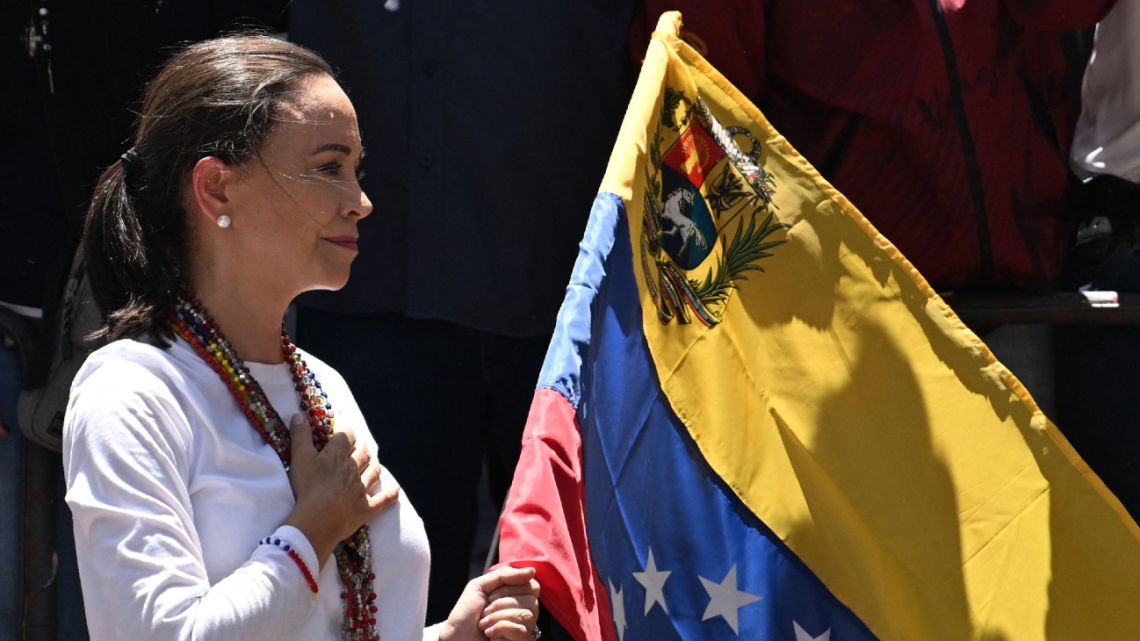


The Council of Europe on Monday awarded its 2024 rights prize to Venezuelan opposition figure María Corina Machado for her struggle for democracy under President Nicolás Maduro’s iron-fisted rule.
Machado said she was “deeply moved, honoured and grateful” to be the first Latin American to win the award, named after the late Czech dissident, playwright and post-communist president Vaclav Havel.
She is currently in hiding in Venezuela in the wake of presidential elections Maduro claims to have won, amid a wave of arrests of members of her inner circle.
González Urrutia went into exile in Spain on September 8.
The award was received on her behalf at Council of Europe headquarters in Strasbourg by her daughter Ana.
“I want to dedicate this recognition to the millions of Venezuelans who, every day, embody Havel’s values and ideas,” Machado said in a video address.
Her movement had demonstrated “the victory of democrats over dictatorship”, she said, adding: “Today our struggle continues, because the truth persists until it prevails.”
She said the significance of the award was “immense” not just for her but “all those who fight for the cause of freedom in Venezuela”.
Machado denounced what she described as 25 years of Chavismo under Maduro and his late predecessor Hugo Chávez who first came to power in 1999.
She described her hiding as “my enforced shelter from the regime’s persecution” but added: “I know I am in the right place at the right moment, steadfast in my convictions. That is why I have decided to continue fighting alongside the Venezuelan people.”
“The dictatorship has begun its inevitable fall,” she declared.
Machado, 56, played a key role in Venezuela’s presidential election in July. Although the authorities proclaimed Maduro the winner, the opposition believes its candidate won.
Previous winners of the Havel prize include the 2023 laureate, the Turkish philanthropist and civil society activist Osman Kavala who remains in prison after his arrest in November 2017, and the 2022 winner is the Russian opposition politician Vladimir Kara-Murza.
The award for Machao came less than 24 hours after the opposition leader reported that her security chief and another staff member had been arrested.
It is the second time Machado’s security chief Milcíades Ávila has been detained; the first was two weeks before the disputed July 28 vote.
The arrests of Ávila and Edwin Moya are the latest in what the opposition says has been a wave of repression following Maduro’s questioned re-election to a third six-year term, rejected by much of the international community.
“Maduro and his regime committed yet another crime. They have kidnapped two honest men, fathers… whose job it is to ensure our security,” Machado said on social media.
“Both have fulfilled their responsibilities in an exemplary manner, always aware of the risk that this entailed in the face of a tyranny that today the world qualifies as a corrupt and criminal system,” she added.
The Foro Penal watchdog had reported 149 “arbitrary arrests,” including 135 members of Machado’s entourage, in the runup to the vote.
Many more have been detained since, and Foro Penal says Venezuela now has the highest number of “political prisoners” in almost 25 years.
Venezuela’s CNE electoral authority, seen as loyal to the regime, declared a victory for Maduro within hours of polls closing, with 52 percent of votes cast.
But most of the international community has refused to accept his win without a detailed vote breakdown, which has not been forthcoming.
The opposition published its own tally of polling station-level results, which it says proves González Urrutia won two-thirds of the votes cast.
The United States says there was “overwhelming evidence” González Urrutia, a 75-year-old retired diplomat, had won.
He has since taken asylum in Spain after spending weeks in hiding in Venezuela after the vote.
Machado, for her part, has come out in public only a handful of times to lead anti-Maduro protests.
Twenty-seven people were killed in post-election clashes and more than 2,400 arrested for taking part in protests, charged with “terrorism.”
– TIMES/AFP